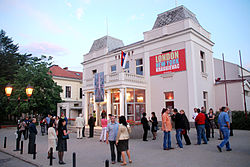About festival
The International Theatre Festival - JoakimInterFest, was named after one of the most important personalities of the Serbian theatre, Joakim Vujić (1772–1847). A writer, comedian, translator, traveler and general manager of the first Serbian theatre founded in Kragujevac, the then capital of Serbia in 1835, Joakim Vujić is at the same time the most controversial and intriguing figure in Serbian theatre history. His libertarian spirit, an impressive number of works, which he left as a legacy and everything he did for the beginnings of the development of organized theatrical life in Serbia, brought him the epithet of "the father of Serbian theatre".
JoakimInterFest was founded in 2006 on the initiative of the then general manager of the Princely-Serbian Theatre, director Dragan Jakovljević, and with great understanding and support from the City of Kragujevac. The then administrations of the theatre and the City of Kragujevac respectively, recognized the need for an international theatre festival that would improve theatre life in this area, and provide loyal Kragujevac audience and employees of this theatre with insight and information into new theatre trends. Thus, the Princely-Serbian Theatre, with its significant tradition, has become the initiator of a more than necessary theatrical exchange, which intensified that segment of theatrical life in this part of Serbia, south of Belgrade.
With the significant help of the theatrologist and critic Dragana Bošković, Dragan Jakovljević performed the curation until 2011. Since 2012, curators (as well as artistic directors) have been elected for at least two years. Goran Cvetković (2012–2014), Željko Jovanović (2015 and 2016), Miloš Latinović (2017 and 2018) and Slobodan Savić (2019 and 2020) made a significant contribution to the festival with their curations. At the beginning of 2019, with the election of the critic Slobodan Savić to the position of the curator and artistic director, the festival changed its name to Joakimfest (2020), and curator Savić advocated the concept of greater international recognition. Unfortunately, the situation with the Covid-19 virus pandemic prevented him from fully realizing all his ideas and plans. [2]
Joakimfest is a festival of contemporary, modern, aesthetically, thematically and poetically referential theatre, which, through the selection of performances, strives to be visible not only in the local community but also in the wider region. Joakimfest celebrates and nurtures an aesthetically sophisticated, socially responsible, subversive and emancipatory theatre that tackles burning issues and phenomena of the time and the world in which we live.
Since the founding of the festival until today, over 140 performances from 25 countries of the world have been performed at Joakimfest, in which more than 700 theatre creators have participated. All these years, the festival has been following with equal attention both well-known authors of the international and domestic theatre scene, as well as those young theatre creators who receive support and the possibility of their wider artistic affirmation at the Joakimfest in Kragujevac. The three-member international jury awards two prizes at the festival: the Grand Prix "Joakim Vujić" for the best overall performance and the Special Award of the City of Kragujevac.
The host and organizer of the festival is the Princely-Serbian Theatre, and the main sponsor is the City of Kragujevac. [3]
This page is based on this
Wikipedia article Text is available under the
CC BY-SA 4.0 license; additional terms may apply.
Images, videos and audio are available under their respective licenses.









